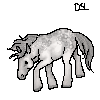07-16-2015, 10:35 PM

what is dead may never die;
but rises again
But hers is a different kind of impossibility, because she is a contradiction. Born to a mother who never carried her, raised in a place where horses cannot survive, Aletheia should not be. And yet she abides, a walking reminder of how magic can play with lives, a girl out of time.
Most of her memories have turned to smoke, but she holds tight to the four things she knows with absolute certainty. Her father is Carnage. Her mother is Librette. Her name is Aletheia. Her home is the Valley. These things are her lodestars, her guiding lights, and they keep her grounded.
And so it is that she, good citizen of the Valley that is her home, comes to the field. It is a pleasant day, summer just starting to slide into fall, the weather neither too cold nor too hot. The field is as empty as it ever is, crowded with all the wrong kinds of horses – too many looking to recruit, too few looking to be recruited. Too many, too many, but it will not deter the girl.
Her icy blue eyes sweep dispassionately across the various groups. She shows no sign of interest; she doesn't know she's supposed to, doesn't know that her face looks almost imposingly impassive. These are the things you miss when you grow up on your own, forget your past, and find yourself dumped entirely unceremoniously into the middle of a snowy meadow as she had been.
The glass girl catches her eye, and she is far enough off that she feels comfortable openly staring. Few things cause her to feel legitimate curiosity, but this comes very close. She is always intrigued by those who, like her, are impossible.
She approaches without hesitation, her steps long and graceful. She is a pretty thing, dainty and refined, her figure girlish and slim. She's fine boned and delicate in a way that her mother had never been. She is young, no more than two or so, and yet she's already turned gray. Her eyes are a startling ice blue, and are surprisingly intense despite the neutrality the rest of her conveys.
She is late to the party by the time she arrives. She recognizes Engelsfors from previous encounters in the field, and she arrives in time to hear the other mare introduce herself as Elysteria. She greets them both with a nothing more than a blank expression before turning to the mare that has drawn them all together. Already the grass at her hooves starts to shiver away from her, curling into itself as though trying to escape.
"Aletheia, from the Valley." she explains, adding her own voice to the mix. It is a fascinating voice, the kind of voice that reads an audiobook, smooth and pleasant, sturdy and even – both remarkable and entirely unremarkable. She is silent for a moment, tilting her head as she considers the glass girl who stands before her "I think I knew someone like you, once." she says, her voice far away as though lost in a dream. She had known someone, but that someone had been a star, burned out many years ago (or still burning, it's impossible for her to say). "What's your name?" she asks and tries to cling to a hope that this girl too is interstellar – that they might be, somehow, alike.
They make quite the pair, really – a glass girl, for whom touches might be dangerous, and a sad girl of the stars, whom it is dangerous to touch - but they are not alike. There is no one like Aletheia – the grass at the glass girl's feet is not wilting and dying. But the grass at Aletheia's feet is shriveling, is always shriveling. It and anything else that has the misfortune to touch her.
aletheia
harder and stronger

